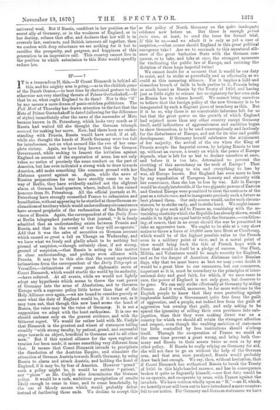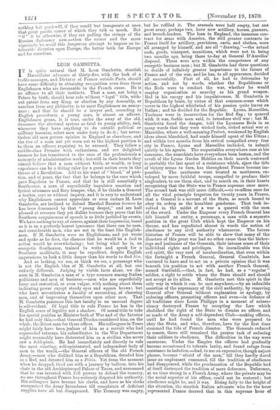IF—?
English people to know that they were protecting against implacable hostility a Government quite free from the guilt of aggression, and a people, not indeed free from the guilt of aggression but owning that guilt, and only asking to be spared the ignominy of selling their own provinces into sub- jugation, than that they were making direct war on a country for which we should all retain the strongest affection and respect, even though the vaulting ambition of statesmen too little controlled by free institutions should o'erleap itself. Through the co-operation of France we could at the same time prevent a great wrong, and bring both Ger- many and Russia to their senses twice as soon as by any other policy. If Russia be really relying on Germany for aid, she will not dare to go on without the help of the German arm, and that arm once paralyzed, Russia would probably draw back fast enough. We say, then, without hesitation, that if Count Bismarck has authorized Russia to break the Treaty of 1856 in this high-handed manner, and has in consequence broken it quite as flagrantly himself,—our first duty would be to co-operate, and co-operate by arms, with France against the invaders. We have written wholly upon an "If,"—an If, which the use of bloody means which would probably defeat we heartily trust will turn out to have introduced a mere counter- instead of furthering those ends. We decline to accept this feit to our notice. For Germany and German statesmen we have iT is a tremendous If, this,—If Count Bismarck is behind all this, and his mighty arm is going,—as in the childish game of the Dumb Orator,—to beat time by rhetorical gesture to the otherwise not very startling threats of Prince Gortschakoff,—If that be so, what ought England to do then? Nor is this "if" by any means a mere dream of panic-stricken politicians. The Pall Mall of Thursday has drawn attention to the fact that the Note of Prince Gortschakoff is dated (allowing for the difference of styles) immediately after the news of the surrender of Metz became known in St. Petersburg, which looks very much as if Russia had waited till she thought the German triumph assured, for making her move. Now, had there been no under- standing with Prussia, Russia would have acted, if at all, while she thought the hands of North Germany were too full for interference, not on what seemed like the eve of her com- plete victory. Again, we have long known that the German Government, while seeking to foment the irritation against England on account of the exportation of arms, has not only taken no notice of precisely the same conduct on the part of America, but has even indicated a strong wish to draw towards America, mid make something like common ground with her Alabama quarrel against us. Again, while the news of Russian preparations for war have steadily come to us by way of Berlin, they have evidently excited not the slightest alarm at German head-quarters, where, indeed, it has rained honours from St. Petersburg. All the official journals at St. Petersburg have strongly counselled France to submission and humiliation, without appearing to be startled at those German re- clamations of territory which would underordinary circumstances have seemed prophetic of the reclamation of -the Baltic pro- vinces of Russia. Again, the correspondent of the Daily News at Berlin telegraphed yesterday to that journal, "it is freely admitted that an understanding exists between Prussia and Russia, and that in the event of war they will co-operate." Add that it was the sales of securities on German account which caused so great a fall on 'Change on Wednesday, and we have what we freely and gladly admit to be nothing but ground of suspicion,—though certainly clear, if not strong, ground of suspicion,—that Russia is acting in this matter in close understanding, and perhaps even alliance with Prussia. It may be to this also that the recent mysterious intimations from the correspondent of the Daily Telegraph at Versailles,—intimations of some great diplomatic move of Count Bismarck, which would startle the world by its audacity, —have referred. At all events, while we would not lightly adopt any hypothesis which seems to throw the vast power of Germany into the arms of Absolutism, and to threaten Europe with a supreme policy little better than that of the Holy Alliance over again,—we are bound to consider gravely at once what the duty of England would be, if it turn out, as it may turn out, that though this new hand Bemis the hand of Russia, the voice may be the voice of Germany. It is not a supposition we adopt with the least enthusiam. It is one we should embrace only on the gravest evidence, and with the bitterest regret. We would far rather hold with Mr. Carlyle that Bismarck is the greatest and wisest of statesmen toiling steadily "with strong faculty, by patient, grand, and successful steps towards an object, beneficial to Germans and to all other men." But if this cynical alliance for the open rupture of treaties has been made, it means something very different from that. It means that Count Bismarck intends to precipitate the dissolution of the Austrian Empire, and stimulate the attraction of German Austria towards North Germany, by using Russia to alarm and attack Austria, and holding the hand of England, if it may be, by fear of America. However "grand" such a policy might be, it would be neither "patient," nor " pious " as Mr. Carlyle also denominates the German policy. It would be a rash, ambitious precipitation of results likely enough to come in time, and to come beneficially, by as the policy of North Germany on the quite inadequate evidence now before us. But there is enough prima Jade case, at least, to send the issue for formal trial.
If this be so,—and we admit it is only as yet a case of suspicion,—what course should England in this great political
emergency take ? Are we to succumb to this unnatural alli- ance of the great barbarian State with the German con- queror, or to take, and take at once, the strongest measures for vindicating the public law of Europe, and resisting the dictation of these huge imperial twins?
We cannot doubt for a moment that it would be our duty to resist, and to strike as powerfully and as effectually as we could at this menacing alliance. For it implies a bold and shameless breach of faith in both parties to it, Prussia being as much bound as Russia by the Treaty of 1856, and having just as little right to release her co-signatary for her own ends as Russia has to release herself. We cannot bring ourselves to believe that the foreign policy of the new Germany is to be inaugurated by such a flagrant piece of treachery as this. But if it be so, why there is no conceivable inference left for us but that the great power on the growth of which England had rejoiced more than any other country except Germany itself, until indications of aggressiveness and ambition began to show themselves, is to be used unscrupulously and lawlessly for the disturbance of Europe, and not for its wise and pacific development. If Germany herself celebrates the attainment of her majority, the arrival of the era when the King of Prussia accepts the Imperial crown, by helping Russia to tear up, without an excuse, a treaty on which the peace of Europe depends, what is left for us but to declare ourselves at once, and before it is too late, determined to prevent the rivetting of this ascendancy on the neck of Europe ? That England has nothing to win and everything to lose by war, all Europe knows. But England has even more to lose by any repudiation of European honesty and sincerity with her connivance, than she has to lose by war. Life in Europe would be simply intolerable, if the two gigantic powers of Eastern
and Central Europe were permitted to treat the contracts of the past as a tabula rasa, and to inaugurate precisely such a future as
best pleased them. Our only course would, under such circum- stances, be to strike early, and to strike hard. We ought imme- diately to give such aid to France as, combining with the as- tonishing elasticity which the Republic has already shown, would enable it to fight an equal battle with the Germans,—condition- ing, of course, that in no event should the war be permitted to take an aggressive turn. We ought to be able at a very short notice to throw a force of 50,000 men into Brest or Cherbourg, which would be of the highest possible value to the French even in a military point of view, and in a moral point of view would bring back the tide of French hope with a force that would in itself be a pledge of success. Our Fleet, Militia, and Volunteers would be ample security for England, and as for the danger of American Alabamas under Russian flags, why that we must brave as best we may ;—no doubt it would be a great blow to our commerce, but our commerce, important as it is, must be secondary to the principles of inter- national duty and good faith, for which, if we once cease to care, the power of England is not only gone, but deserves to be gone. We can only strike effectually at Germany by aiding Prance. And it would, moreover, be far more welcome to the nothing but good-will, if they would but inaugurate at once that great pacific career of which they talk so much. But I " if " it be otherwise, if they are pulling the strings of the Russian diplomacy now,—then the sooner and the more vigorously we assail this dangerous attempt to impose an in- tolerable dictation upon Europe, the better both for Europe and for ourselves.



































 Previous page
Previous page